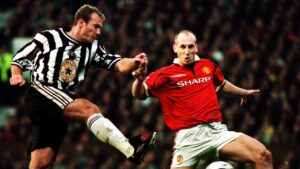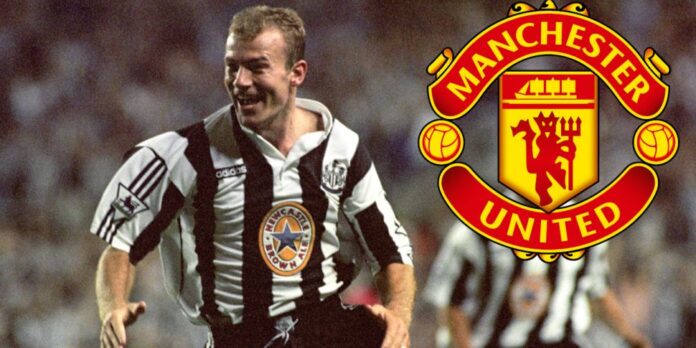The intriguing rivalry between Manchester United and Newcastle United revolves around one of the biggest transfer snubs during the early years of the Premier League.
Alan Shearer, the renowned striker, recently sparked a frenzy among Manchester United fans with a tweet.
It featured a quote from the famous TV gameshow Bullseye, stating, “Look at what you would have won,” accompanied by an image of Sir Alex Ferguson parading the Premier League, FA Cup, and Champions League trophies.
For Shearer, the subject remains a sore one, as he continues to be questioned about his decision to reject Manchester United, not once but twice.
In 1992, Shearer had the opportunity to join Old Trafford, but he opted for Blackburn Rovers, while Manchester United secured the services of Eric Cantona. Cantona played a pivotal role in helping United claim consecutive league titles and an FA Cup victory.
However, the pivotal moment arrived in 1996, during the memorable European Championship, when Ferguson made a significant push to sign Shearer, a striker who was highly sought after at the time, comparable to the likes of Harry Kane or Erling Haaland in today’s context. Shearer had the potential to elevate Ferguson’s United to new heights.
Former United chairman Martin Edwards revealed, “I had actually reached a deal regarding Alan Shearer’s contract. We had come to a settlement. Shearer had been to Ferguson’s house, spoken to him, and assured him of his desire to join.
The issue, I believe, was with Blackburn’s chairman, Jack Walker, who wasn’t particularly fond of Manchester United, considering them local rivals as both clubs hailed from Lancashire.
Walker didn’t want Alan Shearer to join Manchester United. Shearer shared a close bond with Walker, who was like a father figure to him, and he didn’t want to upset him by joining United.
I’m not sure Jack would have allowed him to come anyway, but he was content with Alan moving to Newcastle, as he didn’t see them as a threat.”
The subsequent events are well-known. The public perception was that Shearer had snubbed United, rather than Blackburn snatching him away from their grasp. In reality, it was a combination of both.

United fans found amusement in Shearer’s decision to join Newcastle, where he would become a club legend but fail to secure any major trophies.
Ironically, United signed Ole Gunnar Solskjaer instead, who went on to enjoy tremendous success. During his more than a decade at United, Solskjaer won six league titles, two FA Cups, and the iconic Champions League trophy in 1999, thanks to his famous toe-poke goal that secured the treble in dramatic fashion.
Meanwhile, Newcastle finished 13th in the Premier League that year, and United comfortably defeated them 2-0 in the FA Cup final.
Shearer recently stated, “I was certainly tempted to join Manchester United, but I have no regrets about either decision. I had a remarkable time at Blackburn, winning the league title.
Furthermore, I fulfilled my personal dream of playing for my hometown club, Newcastle. I have cherished memories and a goalscoring record that fills me with pride.”
Ferguson, initially disappointed that Shearer wasn’t swayed to join Old Trafford despite offering him assurances, including the No.9 shirt (with the exception of penalties, as Cantona possessed a perfect record from the spot), ultimately accepted the outcome.
He said, “I thought that if those were his only concerns, we would secure his signature. History will determine whether he made the right choice by picking Newcastle over us.”
Only Shearer truly knows if he has found peace with his decision. While Manchester United didn’t harbor many regrets during that era, being rejected was an unfamiliar experience for them.




